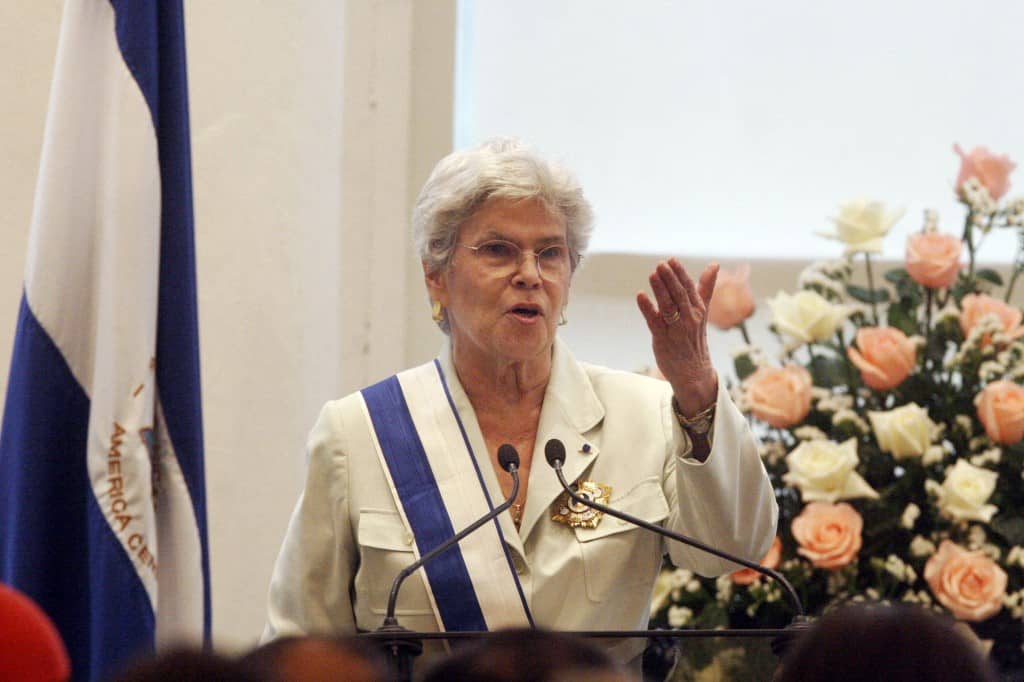Violeta Barrios de Chamorro, Nicaragua’s first female president and a key figure in ending her country’s civil war, passed away peacefully this morning in San José, Costa Rica, at the age of 95. Her family announced her death in a statement shared by her son, Carlos Fernando Chamorro, noting that she was surrounded by loved ones at her apartment. Chamorro’s death marks the end of a remarkable life that left a lasting impact on Central America, and her final years in Costa Rica highlight the deep ties between the two nations.
Born on October 18, 1929, in Rivas, Nicaragua, near the Costa Rican border, Chamorro was thrust into politics after the 1978 assassination of her husband, Pedro Joaquín Chamorro, a journalist and editor of the anti-Somoza newspaper La Prensa. His death sparked the Sandinista Revolution, and Violeta took over the newspaper, becoming a voice for democracy.
In 1990, she stunned the world by defeating Sandinista leader Daniel Ortega in Nicaragua’s presidential election, serving as president from 1990 to 1997. Her leadership brought peace after a decade of conflict between the Sandinistas and U.S.-backed Contra rebels, making her a symbol of reconciliation.
Chamorro’s connection to Costa Rica runs deep. She and her husband lived in exile here in the 1950s, fleeing the Somoza regime’s repression. In recent years, as Nicaragua’s government under Ortega cracked down on dissent, Chamorro and her family faced renewed persecution.
Her children, including Cristiana and Pedro Joaquín, were imprisoned or exiled, and the family’s newspaper, La Prensa, was seized. In October 2023, Chamorro was airlifted from Managua to San José for medical care due to her declining health, including osteoporosis and a brain tumor. She spent her final years in Costa Rica, where her family found refuge from Nicaragua’s political turmoil.
“Doña Violeta died peacefully, surrounded by the affection and love of her children and those who provided her with extraordinary care,” her family’s statement read. They plan a religious ceremony in San José, and her remains will stay in Costa Rica “until Nicaragua returns to being a Republic,” reflecting their hope for a democratic future.
In Costa Rica, Chamorro’s death has sparked reflection on her legacy and the region’s shared history. “She was a symbol of peace and strength,” said Ana Morales, a San José resident who remembers Chamorro’s 1990 victory. “Her time here shows how Costa Rica has been a safe haven for those fighting for freedom.” Social media posts echoed this sentiment, with one user calling her “a brave democrat who lifted peace in Nicaragua.”
Chamorro’s presidency was not without challenges. Her policies faced criticism from both Sandinista supporters and her own allies, but her commitment to ending mandatory military service and fostering democracy earned her international respect. She received awards like the 1991 Democracy Award from the National Endowment for Democracy. After leaving office in 1997, she retired from public life but remained a beacon of hope for Nicaraguans.
As Costa Rica mourns her passing, Chamorro’s life reminds us of the power of resilience and the enduring bond between Costa Rica and Nicaragua. Her family has asked for privacy during this time, and details of the memorial service will be shared soon.






